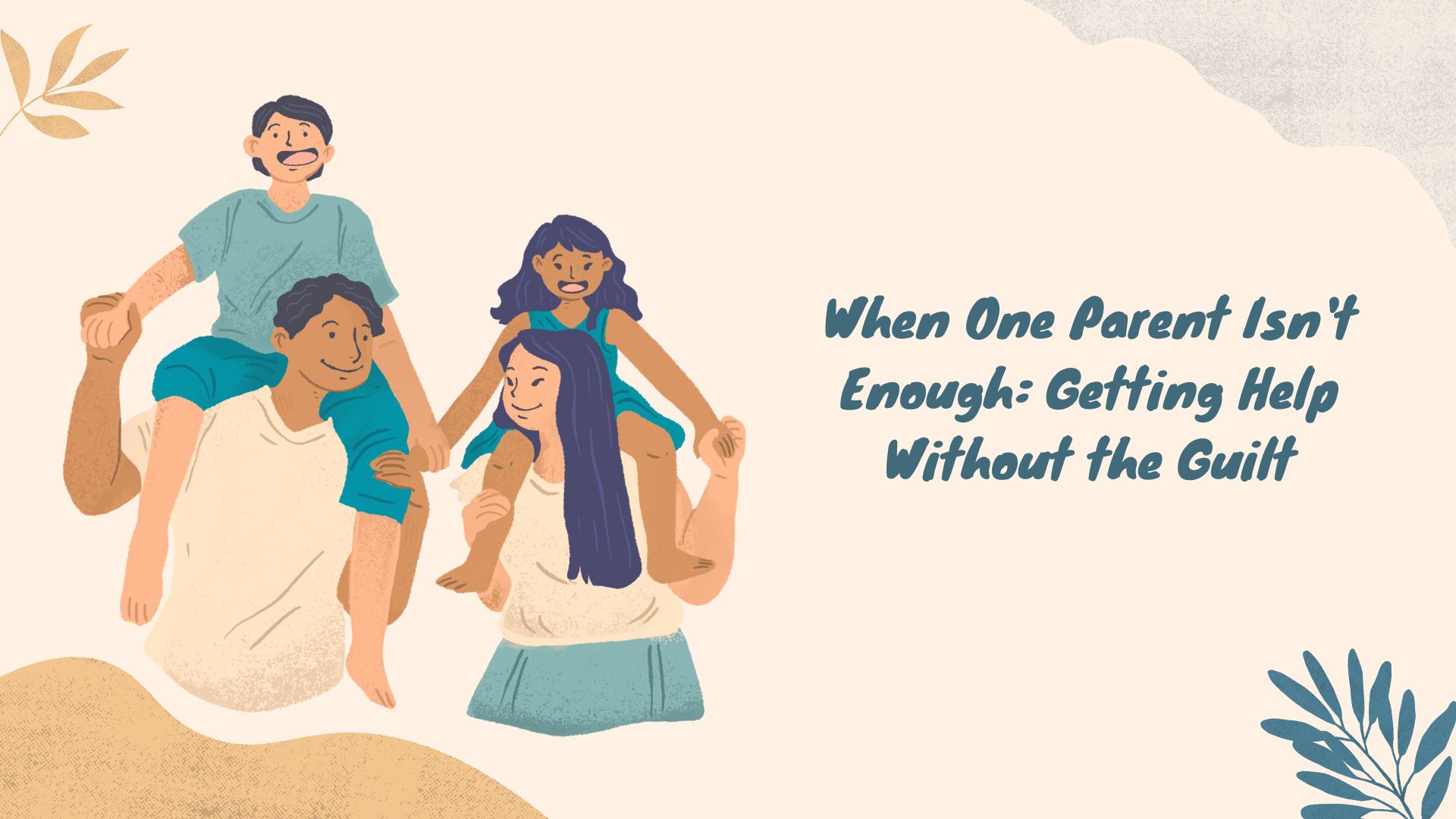You know that feeling when you’re trying to juggle everything at once and it feels like you’re barely keeping your head above water? Maybe it’s getting the kids ready for school while packing lunches, answering work emails, and remembering that your youngest has a doctor’s appointment at 3 PM. Or perhaps it’s those evenings when homework help turns into a three-hour battle, dinner gets burned, and bedtime routines stretch past 9 PM because there’s just so much to do and not enough hours in the day.
If this sounds familiar, you’re definitely not alone. Tons of families reach a point where they realize that having two parents, or even one really dedicated parent, isn’t always enough to handle everything smoothly. The thing is, admitting you need help can feel really hard, especially when there’s this voice in your head saying you should be able to handle it all on your own.
Why Parents Feel Guilty About Getting Help
The guilt thing is totally real, and it comes from a bunch of different places. First, there’s this idea that good parents should be able to do everything themselves. You see other families who seem to have it all together, and you wonder what’s wrong with you that you can’t keep up. Social media doesn’t help either, showing all these picture-perfect family moments that make it look like everyone else has parenting figured out.
Then there’s the money side of things. Getting help costs money, and many parents feel guilty about spending family resources on something they think they should be able to do themselves. It’s like paying someone to clean your house when you have functioning arms and legs, right? Except parenting and managing a household is way more complicated and exhausting than just basic cleaning.
Some parents worry that getting help means they’re not bonding with their kids enough or that they’re missing out on important moments. Others feel like they’re being lazy or taking the easy way out. But here’s the thing that might surprise you: getting help often makes parents better at their job, not worse.
When You Know You Need Extra Support
There are some pretty clear signs that your family could benefit from additional support, even if you haven’t wanted to admit it yet. If mornings feel like you’re running an obstacle course where everyone’s late and stressed, that’s a big red flag. When parents are snapping at each other or the kids more often than usual, it usually means everyone’s stretched too thin.
Another telltale sign is when you find yourself constantly choosing between work responsibilities and family needs. Maybe you’re missing important meetings because of school pickup, or you’re working late every night after the kids go to bed just to catch up. That’s not sustainable long-term, and it’s not fair to you or your family.
Sleep deprivation is another huge indicator. If you’re regularly getting less than six hours of sleep because you’re trying to fit everything into your day, your body and mind are going to start rebelling. Parents who are chronically tired make more mistakes, have less patience, and can’t be present for their families in the way they want to be.
For families exploring their options for additional support, resources such as goaupair.com can provide valuable information about different types of live-in help and what those arrangements typically involve.
The Real Benefits of Getting Help
Here’s what nobody tells you about getting extra help: it doesn’t make you less of a parent. In fact, it often makes you a better one. When you’re not constantly stressed and overwhelmed, you have more patience for bedtime stories and homework questions. You can actually enjoy family time instead of mentally running through your to-do list while your kid is trying to tell you about their day.
Having support also means you can be more present for the moments that really matter. Instead of rushing through dinner because you need to start bath time, you can actually have conversations with your kids. You might even rediscover that you actually enjoy spending time with your family when you’re not completely exhausted.
The benefits extend beyond just the parents too. Kids thrive when their parents are less stressed. They pick up on tension and chaos, even when we think we’re hiding it well. When there’s extra help around the house, kids often feel more secure because their daily routines become more predictable and calm.
Different Types of Help for Different Families
Not every family needs the same kind of support, and that’s totally fine. Some families benefit most from having someone who can handle the morning routine, getting kids fed, dressed, and off to school while parents get ready for work without the usual chaos.
Other families find that after-school help makes the biggest difference. Having someone who can pick up kids, supervise homework time, and start dinner prep can completely transform those crazy evening hours. This is especially helpful for families where both parents work full-time and don’t get home until 6 or 7 PM.
Live-in help works well for families who need flexibility and want someone available for unexpected situations. When your regular babysitter cancels last minute or when someone gets sick and needs to stay home from school, having reliable support already in place removes a lot of stress.
Some families prefer part-time help that comes in for specific tasks or times of day. This might be someone who does pickup and drop-off duties, or maybe someone who handles meal prep and light housework during the day while parents are at work.
Making Peace with Your Decision
The hardest part about getting help is often just making the decision to do it. Parents worry about what other people will think, whether they can afford it, and if it’s really necessary. But here’s the reality: every family is different, and what works for one family might not work for another.
If your current situation isn’t working, something needs to change. That doesn’t mean you’ve failed as a parent. It means you’re smart enough to recognize when your family needs additional support to function well.
Think about it this way: you wouldn’t feel guilty about hiring a tutor if your child were struggling in math, right? Getting help with daily family management is the same concept. You’re investing in your family’s wellbeing and happiness.
Moving Forward Without the Guilt
Once you’ve decided that extra help would benefit your family, the guilt doesn’t necessarily disappear overnight. That’s normal. Start by reminding yourself that taking care of your own needs as a parent is part of taking care of your kids. You can’t pour from an empty cup, and running yourself into the ground doesn’t help anyone.
Focus on the positive changes you start to notice once you have support in place. Maybe mornings become peaceful instead of chaotic. Perhaps you have energy to play with your kids after work instead of collapsing on the couch. These improvements benefit everyone in your family, not just you.
Remember that asking for help is actually a sign of strength and good judgment, not weakness. It shows that you prioritize your family’s well-being over outdated ideas about what parents should be able to handle alone. Your kids will grow up seeing that it’s okay to ask for support when you need it, which is a pretty valuable life lesson.
The bottom line is this: if getting help would make your family happier, healthier, and less stressed, then it’s probably the right choice for you. Every family deserves to feel calm and connected instead of constantly overwhelmed. Sometimes that means admitting that one parent, or even two parents, isn’t enough to handle everything smoothly, and that’s perfectly okay.




